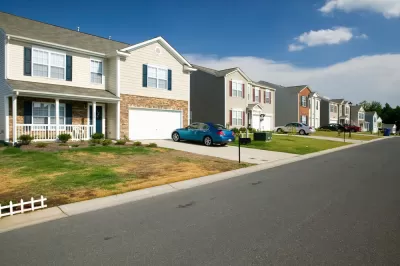A bill filed in early February would prohibit local governments in North Carolina from regulating the appearance of single family homes and duplexes.

Under North Carolina House Bill 36 and Senate Bill 25, design regulations would no longer apply to single family homes and duplexes without consent from neighborhood groups and property owners. The proposal includes some exceptions related to structural safety, historic preservation, and flood insurance programs, but the proposal is otherwise far-reaching, to be applied locally across a range of land uses, permitting classifications and zone districts.
In commercial districts (not included in the proposal), design regulations help ensure the form, appearance, and scale of new development is consistent with desired community character. In residential settings, design regulations help encourage variation, for example to discourage cookie-cutter development patterns in new subdivisions. The proposal is a backlash to more stringent design regulations used in some municipalities, which some feel are excessive.
The residential design standards legislation was introduced alongside another measure which would limit local government powers. House Bill 51 would end the use of extra-jurisdictional control. This refers to land use authority extending to areas just beyond city borders. In many instances these controls help facilitate transition from urban to rural character, for example in stepping-down density allowances. And if city services and infrastructure extend beyond city boundaries, it can make more sense for the municipality to administer local land use regulations. Some feel however, that because affected property owners cannot exercise voting power in the controlling jurisdiction, the practice is unwarranted.
All three proposals passed their first readings and have been referred to local government committees for further review.
FULL STORY: Cities, towns fight NC legislation that would limit their authority

Study: Maui’s Plan to Convert Vacation Rentals to Long-Term Housing Could Cause Nearly $1 Billion Economic Loss
The plan would reduce visitor accommodation by 25,% resulting in 1,900 jobs lost.

North Texas Transit Leaders Tout Benefits of TOD for Growing Region
At a summit focused on transit-oriented development, policymakers discussed how North Texas’ expanded light rail system can serve as a tool for economic growth.

Using Old Oil and Gas Wells for Green Energy Storage
Penn State researchers have found that repurposing abandoned oil and gas wells for geothermal-assisted compressed-air energy storage can boost efficiency, reduce environmental risks, and support clean energy and job transitions.

Private Donations Propel Early Restoration of Palisades Playground
Los Angeles has secured over $1.3 million in private funding to restore the Pacific Palisades playground months ahead of schedule, creating a modern, accessible space that supports community healing after recent wildfires.

From Blight to Benefit: Early Results From California’s Equitable Cleanup Program
The Equitable Community Revitalization Grant (ECRG) program is reshaping brownfield redevelopment by prioritizing projects in low-income and environmental justice communities, emphasizing equity, transparency, and community benefits.

Planting Relief: Tackling Las Vegas Heat One Tree at a Time
Nevada Plants, a Las Vegas-based nonprofit, is combating the city’s extreme urban heat by giving away trees to residents in underserved neighborhoods, promoting shade, sustainability, and community health.
Urban Design for Planners 1: Software Tools
This six-course series explores essential urban design concepts using open source software and equips planners with the tools they need to participate fully in the urban design process.
Planning for Universal Design
Learn the tools for implementing Universal Design in planning regulations.
Ascent Environmental
Borough of Carlisle
Institute for Housing and Urban Development Studies (IHS)
City of Grandview
Harvard GSD Executive Education
Toledo-Lucas County Plan Commissions
Salt Lake City
NYU Wagner Graduate School of Public Service


























